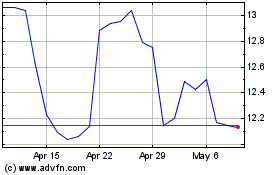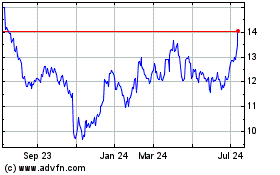By William Boston
This article is being republished as part of our daily
reproduction of WSJ.com articles that also appeared in the U.S.
print edition of The Wall Street Journal (June 22, 2018).
BERLIN -- Global auto stocks were pummeled Thursday after
Daimler AG issued a profit warning overnight that the Mercedes-Benz
owner pinned on trade tensions between the U.S. and China.
Daimler warned that Chinese retaliatory import duties on cars
built in the U.S. would hurt sales of its sport-utility vehicles in
the world's largest auto market. Its shares fell 4.3%, and
investors anticipated trouble for other car makers, including the
two other German auto giants, BMW AG and Volkswagen AG. In U.S.
trading, General Motors Co. Fiat Chrysler Automobiles NV, Ford
Motor Co. and Tesla Inc. took a hit as well.
German auto makers build tens of thousands of SUVs in the U.S.
for export to China, and it appears new Chinese tariffs could hit
them harder than American manufacturers that Beijing explicitly
targets. With global supply chains designed for a world of open
trade and low tariffs, Germany's auto giants are being caught in
the crossfire with few opportunities to shift sales to more
welcoming markets.
"Uncertainty and chaos have consequences, and we're starting to
see that, " said John Bozzella, head of Washington lobbying group
Global Automakers and Here for America, a coalition of companies
including Mercedes-Benz, BMW and Honda Motor Co., among others.
Thomas Sedran, Volkswagen's strategy chief, said he didn't want
to speculate about how the company would respond to higher U.S. and
Chinese tariffs, or trade tensions between the U.S., Mexico and
Canada. He did, however, acknowledge that Volkswagen, the world's
biggest auto maker by sales, had few routes of escape.
"Shifting production on short notice is not possible, it's not
feasible. At the end of the day this will have an impact on the
pricing of vehicles. At this stage we are in a more reactive mode,"
he said.
A BMW spokesman said the company was exploring a "variety of
scenarios and strategic options," but wasn't making any changes
yet. "The company's business outlook remains unchanged," he said,
adding that its forecasts presume "global economic and political
conditions do not change significantly."
In May, China said that as of July 1, it would cut tariffs on
vehicle imports to 15% from 25% to quell U.S. complaints of a trade
imbalance. But after President Donald Trump went ahead and ordered
import duties on billions of dollars of Chinese goods, Beijing said
it would maintain its longstanding duty on U.S.-made vehicles and
threatened to take it even higher.
German auto makers such as BMW, and Daimler's Mercedes-Benz, as
well as electric-car maker Tesla and Ford, would have benefited
from the lowering of Chinese duties. About 267,000 U.S.-built
vehicles were sold in China last year, according to research firm
LMC Automotive.
Ford exported 45,000 vehicles, including Mustang sports cars,
Explorer SUVs and some Lincoln-brand models. The company said
Thursday that it is continuing to encourage both governments to
work together.
For Tesla, China has become its second-biggest market and a
critical one as the electric-car company seeks to transform into a
mass-market auto maker. Last year, Tesla sold about 15,000
U.S.-made cars in China, with its revenue there doubling to $2
billion even with the 25% tariffs as Chinese consumers have been
willing to pay well above the sticker price.
Fiat Chrysler and General Motors would likely be less affected
by a higher import duty. Fiat Chrysler last year exported roughly
17,000 American-made vehicles to China, building many of its
lower-end SUVs in the country. GM exports only a few hundred niche
vehicles to the country, relying largely on locally made product
for what is its largest market. GM said in a statement that it is
assessing the potential impact of the various trade and tariff
actions.
Toyota Motor Corp., Japan's largest auto maker, doesn't export
at all from the U.S. to China.
Daimler called China's import tax on U.S. autos the "decisive
factor" for lowering its earnings projection. "This effect cannot
be fully compensated by the reallocation of vehicles to other
markets," it said in a statement late Wednesday. The company
declined to comment further.
But given that the U.S. and Chinese trade threats are still
shaking out, some analysts wondered if Daimler was using the
tariffs as a smoke screen to conceal problems with its product
lineup.
"We find it curious that Daimler should act now," said Arndt
Ellinghorst, an analyst at Evercore ISI, a London-based brokerage.
"Could it be that the company's aging SUV portfolio is experiencing
lower sales and higher costs than expected across the board,
irrespective of the ongoing trade discussions?"
Still, Daimler's profit warning is one of the first signs that
Mr. Trump's trade actions are fueling a retaliation that is hurting
manufacturers in the U.S. that send their products abroad.
Trading policies that threaten auto makers' bottom lines could
have negative ripple effects throughout the U.S. supply chain and
across the industry, Global Automakers' Mr. Bozzella said. "Even if
the logic is we're trying to invite a negotiation, the unfortunate
reality is then the U.S. worker becomes a bargaining chip."
The German auto industry has long made a huge bet on China --
and on U.S. production. BMW and Mercedes-Benz generate about a
quarter of their unit sales in China, with a large portion of those
vehicles exported from their factories in Europe and North
America.
Daimler, BMW and Volkswagen now operate four manufacturing
plants in the U.S. that employ 36,500 American workers. Last year,
the German companies produced 804,200 vehicles at those plants, but
less than half were sold in the U.S. The rest, around 480,911
vehicles, were exported to Canada, Mexico, Europe, China and other
markets.
Of the 594,000 vehicles that BMW sold in China last year,
including its top-line sedans and SUVs, around 194,000 were
imported. Just under 100,000 of those vehicles came from BMW's
plant in Spartanburg, S.C., the company's main production site for
its X-series line of SUVs, which produced 371,000 vehicles last
year.
Though not related to the U.S. tariff moves, BMW is already
shifting some U.S. SUV production, a portion of its X3 output, to
China rather than continue to export those vehicles from the U.S.
An acceleration of this trend could mean job losses in the U.S.
Volvo, the Chinese-owned Swedish premium car maker, opened its
first U.S. manufacturing plant in South Carolina this week. The
plant will manufacture Volvo's new S60 luxury sedan and already
employs 1,200 workers. By the end of the year, that number will
rise to 1,500, Volvo CEO Hakan Samuelsson told The Wall Street
Journal. In three years, Volvo plans to add a second model and
boost employment to 4,000 people.
"But half of those people will build cars for export," said Mr.
Samuelsson. "Those jobs would be in jeopardy if trade is
restricted. We hope that will not happen."
--Mike Spector, Tim Higgins and Christina Rogers contributed to
this article.
Write to William Boston at william.boston@wsj.com
(END) Dow Jones Newswires
June 22, 2018 02:47 ET (06:47 GMT)
Copyright (c) 2018 Dow Jones & Company, Inc.
Ford Motor (NYSE:F)
Historical Stock Chart
From Mar 2024 to Apr 2024

Ford Motor (NYSE:F)
Historical Stock Chart
From Apr 2023 to Apr 2024
